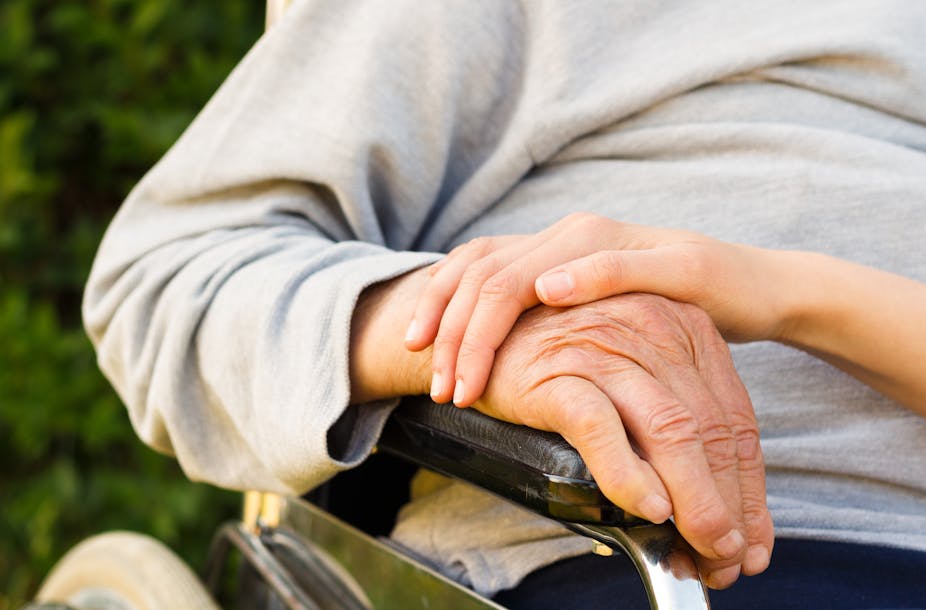Northern Ireland recently changed the law to criminalise the act of paying for sex. This follows a trend set in Sweden, where selling sex is legal but buying it is criminalised.
This so-called Nordic model is being considered in other parts of the world too. In England, for example, many feminist organisations are calling for the criminalisation of clients rather than sex workers. The European Parliament backs such a move and Ireland and Belgium are said to be considering it too.
Arguments on this issue often focus on whether or not the Nordic model protects those who sell sex or makes them more vulnerable. A major concern is that the criminalisation of clients has negative effects on the safety, wellbeing and health of sex workers. Yet there is another side to the problem – the sexual fulfilment of vulnerable clients, such as those with a disability.
People with disability are often regarded as less sexual. Societal perceptions of their sexuality and desire for sexual fulfilment are influenced by stigmatisation and a lack of awareness. This could mean that some people with disabilities might experience difficulty in finding a partner with whom they can experience sexuality and intimacy.
In a 2005 survey of Disability Now readers, almost 12% of male respondents said they had bought the services of a sex worker. As many as 40% of men and 16% of women had thought about buying sexual services – although less than 1% of the women actually went through with it.
Demonising men who buy sex
Abolishing the sex industry and further criminalising clients has long been on the agenda for the UK government. Clients are viewed as supporting the illegal drugs trade and as contributing to the spread of sexually transmitted infections. In London, the number of arrests for soliciting a sex worker rose from 81 in 2010 to 180 in 2013.
Clients are often portrayed as men who enjoy degrading women and even violent characters who like to abuse them. But much of the research on clients contradicts this view. It suggests clients purchase the services of sex workers for a variety of reasons. These include sexual frustration, wanting more variety in sexual partners, desiring specific sexual practices, the thrill of the risk that is involved in buying sex, not wanting a committed relationship, loneliness, or simply the inability to find a sexual partner.
Looking at 50 recent reviews on Punternet, an information sharing website for clients of the sex industry in the UK, gives further insight into why men buy sex. Out of the 50 analysed reviews, only one was very derogatory and disrespectful.
The vast majority of the comments focused on the service provided as well as the characteristics of the sex worker and were generally very positive. “She is an intelligent and bubbly lady and put me at ease with her bright and funny conversation,” read one. “She certainly likes to be kissed and cuddled and treated like the lady she is”.
Around 30% of the reviews specifically addressed the quality of the “girlfriend experience” offered and many more commented on aspects such as eye contact, kissing and cuddling. This indicates not only their desire for a sexual partner, but also an intimate and authentic experience.
Comments left on Punternet by clients with a disability indicate that these disabled men generally made very positive experiences when buying the services of a sex worker. Take this review, for example:
Before we had met, Pru had answered all my questions with respect and thoughtfulness. The actual pleasure I got from being released from the restrictive movement that clothes give me was amazing. (…) Pru is also very good at discovering other often neglected parts of the body. She is an excellent kisser and gives wonderful cuddles and strokes. (…) To me the experience was a dream come true and to top it all Pru is a lovely person.
Tuppy Owens, sex therapist and founder of the TLC Trust, which connects people with disability with sex workers, argues the effects of criminalising clients would be tragic for people with disability.
She notes that while many clients will simply go underground to avoid being caught if criminalisation becomes a reality, this is less of an option for people with disabilities. Many rely on a third party to help them access sex services.
Criminalising clients would therefore render it impossible for some people with disability to explore their sexuality and experience intimacy.
“There are lots of different reasons why people go to see sex workers,” says Owens. “And sometimes it is just to go and cry on their shoulder or cuddle or something because people feel so unloved and untouched.”
The Australian organisation Touching Base, which is based in New South Wales where the sex industry is decriminalised, is another example of an organisation that helps people with a disability access sex services. It offers training for sex workers who work with clients with disability, teaching them about accessibility, different forms of disability and impairments, and occupational health and safety.
The organisation also provides training for service providers and carers. Initiatives that connect sex workers and people with disability and ensure that the services are provided in a professional and mutually beneficial way would no longer be possible under a model of client criminalisation.
People who are unable to find a sexual partner due to social difficulties, their appearance, age, or disability, or who have lost their partners, would have to live a sexless life.
We need to acknowledge that people with disability have sexual needs too and that not everyone can fulfil their needs with a non-commercial sexual partner. We should promote rather than restrict initiatives that allow them to explore their sexuality in a safe and mutually respectful way with a trained sex worker.

